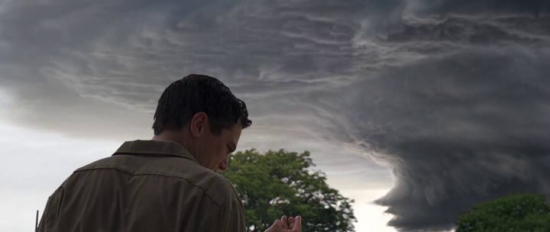The Ikea Desk of Horror Movies

Intimate dread evoked by ecological, economic, and social circumstances, an atmosphere of dread created by the anxieties that manifest when tripped by a single, overarching fear. 2011's Take Shelter is a horror film founded on the threat of imminent, dangerous climate change as well as the treachery of one's own mind. It succeeds where M. Night Shyamalan's The Happening failed spectacularly. It's not a masterpiece, in fact it's in many ways rather unimaginative. It's "well made" in the unflattering sense of the phrase, but a perfectly decent little haunted house.
Michael Shannon stars as another high strung, creepy guy, this one named Curtis. Again, he's playing a guy who seems like he might shatter his teeth for the grinding at any moment. And Shannon does excel at this. Curtis certainly has a lot to worry about--he's having dreams and hallucinations of an apocalyptic storm that rains motor oil which seems to turn people into murderous zombies. So, like a man who's received a divine vision, he starts building an expensive underground storm shelter.

Religion isn't addressed too directly, but we get the sense that Curtis and his family are at the very least deeply conservative. At the same time he takes measures in case the visions are true, he's also conscious that his mother is a paranoid schizophrenic and begins to see a counsellor at a free clinic. I feel like the movie might have been an attempt to persuade conservative audiences of the veracity of some issues considered liberal--Curtis and his young daughter's health needs are inadequately addressed by the health insurance Curtis gets through his job, his concern for his own masculinity prevents him from confiding in his wife about his dreams, and of course, the whole town growing to distrust him for his dramatic predictions of natural disaster makes him seem like the Al Gore of his microcosm.
The filmmakers use these political issues to create tension in the story, which is about 75% effective, and I suspect will seem less so in twenty five years, unless poor healthcare become romanticised like the Old West, which, who knows? Maybe it will.

Another thing that makes the creative scope of the movie feel narrow is the surprising quantity of familiar faces. Curtis' best friend is played by Shea Whigham, one of Michael Shannon's costars on Boardwalk Empire, his mother's played by Kathy Baker, his counsellor is played by Lisa Gay Hamilton from The Practice. Almost every time a character is introduced I recognised him or her from somewhere else. Which I have no objection to in itself but it contributes to the feeling that this movie came through a system. Particularly in the case of Curtis' wife, played by Jessica Chastain, who was all of a sudden in seven movies in 2011. The familiar faces somehow compliment the inert characterisations. Chastain's character doesn't seem to have any personality to speak of, she just reacts predictably mad when she finds out her husband's been keeping things from her, has a just credible mix of anxiety about and faith in her husband.
Curtis' dreams and hallucinations also feel sort of pre-packaged. The zombie people jumping out unexpectedly--one standing motionless in the road, causing him to hit a tree with his car, another staring eerily through a window at his house--they're all familiar bits from other zombie movies. There's some business with Curtis' dog that was taken from Suspiria. It deploys these bits well enough, they made me jump. But it felt like the director was chaining together movie moments that effectively made him uncomfortable rather than thinking of how to use the language of cinema to convey his own unease.

If a movie were a multiple choice test, director Jeff Nichols got every question right in Take Shelter. Which is impressive, in a way. The movie's a nice little horror review.